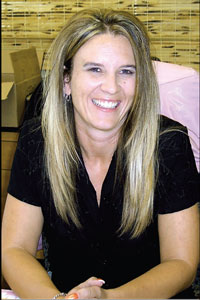Disability resource center leader helps “others help themselves”
On the long drive home, her mind races. She thinks about the boy who suffers from agoraphobia. She thinks about the girl who can’t stop drinking. Her thoughts are accompanied by silence. She turns on some relaxing music and takes a sip of her Pepsi. She looks up at the stars and nostalgically recalls wanting to touch them as a teenager. Pulling into her driveway, she puts her concerns aside, but the traces of the day never completely leave her.

This archived article was written by: Stephanie Sparkman
On the long drive home, her mind races. She thinks about the boy who suffers from agoraphobia. She thinks about the girl who can’t stop drinking. Her thoughts are accompanied by silence. She turns on some relaxing music and takes a sip of her Pepsi. She looks up at the stars and nostalgically recalls wanting to touch them as a teenager. Pulling into her driveway, she puts her concerns aside, but the traces of the day never completely leave her.
Jan Thornton is a new face to many students, but she is not new to the College of Eastern Utah. She is in charge of the disability resource center as well as student counseling.
She is an alumna to the College of Eastern Utah and originally planned on getting a degree in aerospace engineering.
During her freshman year, Thornton took pre-requisites in computer-aided drafting. She said that she is “only one class away from getting [her] drafting certificate.” What triggered a change from drafting and star gazing to social work?
One word – VISTA. (Not the Windows program) VISTA stands for Volunteers in Service to America. Their mission statement is “Helping Others Help Themselves.” It is an organization aimed at bringing individuals out of poverty. As part of her experience with VISTA, Thornton worked at a juvenile detention center mentoring for one year. She was hired on as a regular worker shortly after. She made the switch to CEU because she saw “more options available” to help students in need.
Aside from her job as a counselor, Thornton is a mother. She was a nontraditional student at the College of Eastern Utah, juggling her time between school and family. She says, “I went against the odds.” Her daughter was born when she was 17 years old and she remained single until she reached the age of 20. She put herself through school and started with her bachelor’s degree soon after.
Some students may find it awkward to approach a stranger with their personal issues and concerns. Thornton, however, tries to be as available as possible. “I really try to be responsive to students so that if they do come in here, and I can see that they are in crisis, I will try to schedule them in right away.”
Despite her responsibility, she places students and relationships above paperwork. Dealing with students from a variety of backgrounds, cultures, and issues can be daunting. Thornton, however, tackles the task in stride. She has been working in human services since 1996 and recognizes the importance of culture in its entirety.
“Culture isn’t just race. It isn’t just ethnic background. It is family culture and neighborhood culture. It is very unique to each person,” she said.
Thornton offers this advice to students concerning their long-term mental wellness, “Take care of yourself first. Take care of your physical health. Make sure you’re eating right, and make sure you’re sleeping well. That in and of itself can do wonders for a lot of students.”
In contrast, she suggests getting immediate help if a student is under a lot of pressure or needs a listening ear. “If for some reason [a student] starts to struggle with something, I recommend that they get in early. Get on top of it before it gets out of hand,” she said.
Thornton relayed that most of the problems that occur on campus are very treatable “unless students let it get out of hand.” The difficulty is recognizing what students can manage on their own and what they cannot.
Thornton is a counselor and a disability resource director. She is a dreamer, a mother and a friend. Most importantly she is a caring individual willing to listen to students’ concerns. Talk with her and get to know her.




